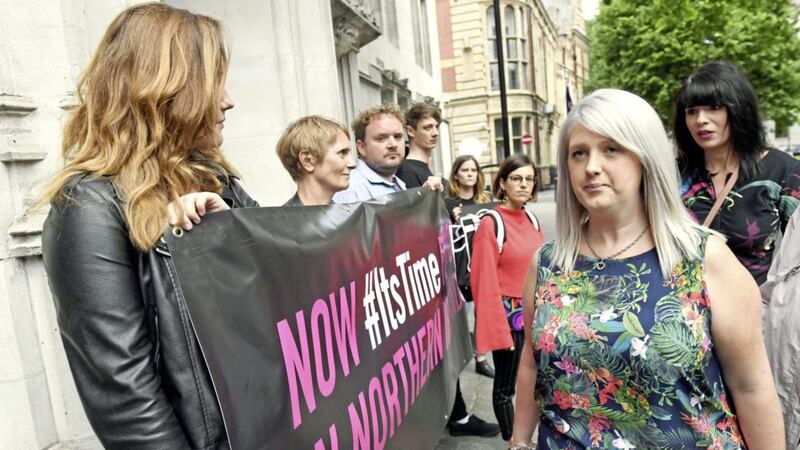Everyone has enormous sympathy for Sarah Ewart, said Jim Wells. I left your office very upset, said Sarah Ewart. It made riveting radio.
The woman at the front of the struggle for abortion here rubbished the former DUP health minister’s version of their 2013 encounter, the start of her long and painful campaign to prevent other women suffering like her. Wells started by telling Nolan no legal change is needed. What he had told Ewart, she said, was that consultants ‘get it wrong, my baby would have survived’. A senior adviser, she added, had to correct him.
Wells said that three officials witnessed that meeting and his recollection was very different from hers. A Nolan interruption furthered the understanding of listeners. Half a dozen exchanges in, he asked why Wells had not looked once at Ewart. He could have added that Ewart had begun with a polite ‘Good Morning Mr Wells’ to silence, and that he had repeatedly reminded Wells without response that she was in the studio. The DUP man bumbled about the mike and the seats.
On another show he equated British abortion with the Holocaust; veteran notice-box, he loves his latest role as DUP dissenter. For repeated offensiveness he has been supposedly reprimanded by having the whip removed.
But Stormont is not functioning, and extremist though he is, he chimes with prominent voices. His ‘I believe the people of Northern Ireland believe’ that the north’s regime saves thousands of babies is asserted – as unarguable - by a range of anti-choice voices, Catholic and Protestant, nationalist and unionist.
Polls say different, especially on the question of fatally compromised pregnancies, rape and incest. Alban Maginness, the Brollys, Father Patrick McCafferty, Bernie Smith as well as Sammy Wilson and Ian Paisley line out nonetheless to claim they are ‘The People’.
The DUP leader, the northern politician British prime minister Theresa May defers to, has to date stuck with the cross-community conservatives who deny women choice. The record shows her at age 19 jeering at the ‘Roman Catholic’ Republic for denying abortion. On social issues Arlene Foster may have regressed to fit the party she leads. On this, as in so much else, her judgment is poor.
Her instant verdict on the Republic’s referendum landslide was that it would have no impact on the north’s laws. ‘We’re keeping May in post’ went unspoken. This was a devolved matter, for decision at Stormont. But standing on Stormont’s rights when Stormont is missing, increasingly presumed lost by some, is not the strongest position.
The president of the British Supreme Court last week made her own considered comment on judges versus politicians in relation to abortion. Judges, she said, might be better qualified than politicians to decide on abortion because they could be ‘dispassionate’ about evidence.
‘This is not a matter on which the democratic legislature enjoys a unique competence’ said Lady Hale (first woman to head the court). She found no evidence that ‘the profound moral views of the people of Northern Ireland were against allowing abortion in cases of sexual crime and fatal foetal abnormality, ‘quite the reverse.’ Not enough ‘to outweigh the grave interference with the rights of pregnant women in making them continue pregnancies to term when they had reached a different moral conclusion...’ She had little doubt that the Northern Ireland law inflicted ‘inhuman and degrading treatment’ on some women.
A majority in her court, including former Northern Ireland Lord Chief Justice Brian Kerr, found that the law as it stands breaches the European Convention on northern women’ s human rights. One said bluntly that it is ‘untenable.’ The disposition of the judges was unmistakeable. But because the Human Rights Commission fronted the case rather than exploit a ‘victim’ the court could not deliver a ‘declaration of incompatibility’.
Something the courts here would almost certainly (surely?? you might well think?) have agreed with next time they are faced with the question. Instead of passing it back again to politicians perhaps permanently absent from Stormont, though still paid their entire wages thanks to that deal between May and Foster’s DUP.
Ewart’s courage, with the support of Amnesty, the Human Rights Commission and assorted protesters sustains the momentum for what is now an unstoppable cause. Back in the High Court though, seeking a review, she could be on a grimly circular track. Still, Sammy Wilson ranting upped the challenge to MPs to ‘decriminalise’ abortion throughout the UK. And perhaps also to May to do the decent thing and put it up to the DUP; to measure up to the newly-liberated south.








